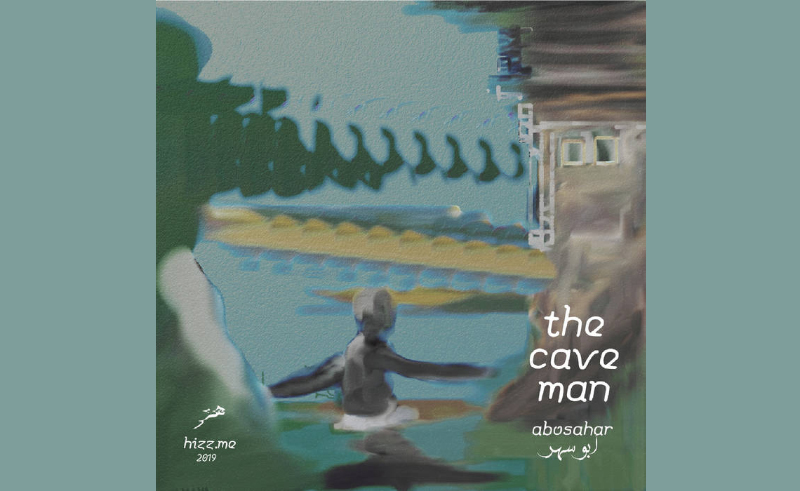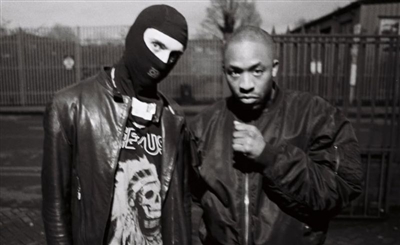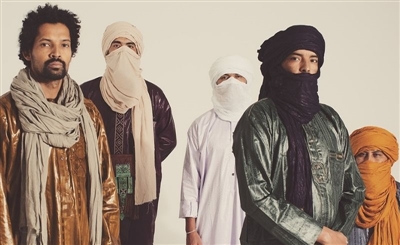Copied
Review: Abosahar's Long-Awaited LP 'The Caveman' Gives Shaabi a New Dimension
ABOsahar's trobby music is here for the long haul.
Aug 06, 2019

Raised on a farm in Upper Egypt’s Governorate of Minya, Ashraf Abuzeid aka ABOsahar was a resourceful child growing up, set on making music out of elastic bands, cardboard boxes, plants or anything he could get his hands on. Upon discovering digital music software, he began producing tunes and hasn’t stopped since, constantly uploading on his Youtube, Soundcloud and Instagram as DJ ABOsahar. Touring Menya's weddings, ABOsahar started DJing, MCing, and performing live using Fruity Loops with his now infamous set up — a computer keyboard and a TV screen.
<iframe width="560" height="315" src="https://www.youtube.com/embed/i0-kxnbCx24" frameborder="0" allow="accelerometer; autoplay; encrypted-media; gyroscope; picture-in-picture" allowfullscreen></iframe>
Like many shaabi and mahraganat artists, Abuzeid grew up with limited resources and no formal music training, leading him to construct his own musical fingerprint through exploring different ways to make music. The result was his DIY-interpreted, unheard of form of shaabi, a genre that was already birthed from an unavoidable DIY spirit. ABOsahar's music continues to push and contort the boundaries of a genre that spans decades, and yet is still being shaped.
<iframe width="100%" height="166" scrolling="no" frameborder="no" allow="autoplay" src="https://w.soundcloud.com/player/?url=https%3A//api.soundcloud.com/tracks/479449635&color=%23ff5500&auto_play=false&hide_related=false&show_comments=true&show_user=true&show_reposts=false&show_teaser=true"></iframe>
Cue to late 2017 when HIZZ, a Detroit/Cairo-based label promoting local experimental electronic and dance music, stumbled across the Minya native's distinct style and invited him to their Garden City and ended up signing him. Certainly a captivating journey and story that had us immediately wanting to sit down with ABOsahar, something we finally got round to doing last November as he was recording his album at the HIZZ HQ and studio.
<iframe width="100%" height="166" scrolling="no" frameborder="no" allow="autoplay" src="https://w.soundcloud.com/player/?url=https%3A//api.soundcloud.com/tracks/550044108&color=%23ff5500&auto_play=false&hide_related=false&show_comments=true&show_user=true&show_reposts=false&show_teaser=true"></iframe>
“Once I started using my computer to make music, I figured why not use the computer’s keyboard as an instrument like the synth, oud or flute?” Ashraf told us. “I have to be musically trained to play an actual keyboard, and I’m not. I’m all about simplifying things, that’s what my trooby style is about,” he continues, referring on what has become his trademark sound, his own genre. “It’s free flowing music.”
Nine months later and one HIZZ EP in, ABOsahar and Hizz's efforts substantiated into the producer's debut LP The Caveman , a 10- track progressive shaabi and mahraganat album with a refreshing take on the genre. Filled with hard hitting beats, ABOsahar's menacing, idiosyncratic synths and keys, introspective lyrics and samples, The Caveman is an entrancing journey into his untamed creative process.
<iframe src="https://open.spotify.com/embed/album/3bxLo90RaVdGAlrSTSDuEU" width="300" height="380" frameborder="0" allowtransparency="true" allow="encrypted-media"></iframe>
Opening the album is 'Farah Al Minya', which translates to ‘Minya's Wedding’, a very clear ode to his hometown. Following the style of shaabi wedding music, the track features Abuzeid MC-ing and hyping things up as he performs unwavering synths over shifting percussions. With an intense, ecstatic tempo rise at its outro, 'Farah Al Minya’ transforms into a full fledged shaabi frenzy, where ABOsahar manages to paint vivid imagery of his craft as a long-time wedding performer.
<iframe src="https://open.spotify.com/embed/track/14wUs2JSeilst4Ssl3IXmV" width="300" height="380" frameborder="0" allowtransparency="true" allow="encrypted-media"></iframe>
‘My Life’ is an autobiographical mahraganat track that kicks off with a 2000s oriental techno moment before an auto-tuned ABOsahar raps and sings of fragmented memories, his wanderings and his experience over mahraganat beats. "We started out of a nook in the street and all those who heard me told me I was gifted" ABOsahar mumble raps with vocal samples shuffling in and out the track.
<iframe src="https://open.spotify.com/embed/track/3ZjGnR1pKZNOkBqIGkqZBL" width="300" height="380" frameborder="0" allowtransparency="true" allow="encrypted-media"></iframe>
An album highlight is 'Hangover', a track that starts with a rather typical shaabi sound before delving into a dirty, gritty bass-heavy territory laden with percussive slides. Purely instrumental, 'Hangover' gives insight into ABOsahar's strong arrangements and his savage, innate ability to craft sound.
<iframe src="https://open.spotify.com/embed/track/5qz0LQFJRkGfTVqXTg3fhZ" width="300" height="380" frameborder="0" allowtransparency="true" allow="encrypted-media"></iframe>
'Msh 7az Laa Shatara' is a track boasting ABOsahar's street cred where he sings “It’s not luck, it’s skill" in an auto-tuned chorus line referencing himself. He further on sings witty written lines such as "Kolo beytghaba, beytghaba, bae't ghaba" meaning that we're borderline living in a jungle where people's actions and behaviors went too far. This track doesn't limit itself as merely a boastful clout track, but equally a track that speaks of social commentary, romance and more.
<iframe src="https://open.spotify.com/embed/track/5qz0LQFJRkGfTVqXTg3fhZ" width="300" height="380" frameborder="0" allowtransparency="true" allow="encrypted-media"></iframe>
Freeing himself from the tropes and constraints of shaabi, mahraganat, and music in general, The Caveman showcases ABOsahar's distinct and remarkable interpretation of the genre, deconstructing it and equally reshaping it, adding his own fragment to a genre that's constantly witnessing its own progression and evolution. Perhaps what truly sets this record unique is ABOsahar's naturalistic approach towards music, or trooby as he calls it.
- Previous Article Getting Abyusif
- Next Article 23 Must-Watch Middle Eastern Music Documentaries
Trending This Month
-
Jan 29, 2026






















